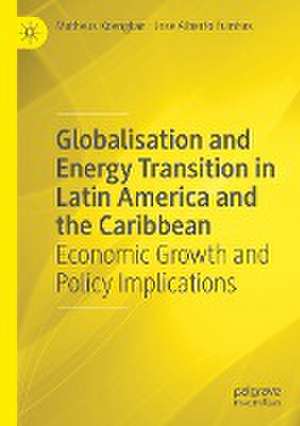Globalisation and Energy Transition in Latin America and the Caribbean: Economic Growth and Policy Implications
Autor Matheus Koengkan, José Alberto Fuinhasen Limba Engleză Paperback – 15 oct 2023
This book aims to highlight econometric techniques that can be used to tackle issues relating to globalisation, the energy transition, and environmental degradation. It will be relevant to researchers and policymakers interested in energy and environmental economics.
| Toate formatele și edițiile | Preț | Express |
|---|---|---|
| Paperback (1) | 637.13 lei 6-8 săpt. | |
| Springer International Publishing – 15 oct 2023 | 637.13 lei 6-8 săpt. | |
| Hardback (1) | 642.51 lei 6-8 săpt. | |
| Springer International Publishing – 14 oct 2022 | 642.51 lei 6-8 săpt. |
Preț: 637.13 lei
Preț vechi: 749.56 lei
-15% Nou
Puncte Express: 956
Preț estimativ în valută:
121.91€ • 132.84$ • 102.73£
121.91€ • 132.84$ • 102.73£
Carte tipărită la comandă
Livrare economică 23 aprilie-07 mai
Preluare comenzi: 021 569.72.76
Specificații
ISBN-13: 9783031138874
ISBN-10: 3031138872
Pagini: 254
Ilustrații: XV, 254 p. 28 illus., 5 illus. in color.
Dimensiuni: 148 x 210 mm
Greutate: 0.33 kg
Ediția:1st ed. 2022
Editura: Springer International Publishing
Colecția Palgrave Macmillan
Locul publicării:Cham, Switzerland
ISBN-10: 3031138872
Pagini: 254
Ilustrații: XV, 254 p. 28 illus., 5 illus. in color.
Dimensiuni: 148 x 210 mm
Greutate: 0.33 kg
Ediția:1st ed. 2022
Editura: Springer International Publishing
Colecția Palgrave Macmillan
Locul publicării:Cham, Switzerland
Cuprins
1 Introduction.- 2 Renewable Energy Transition and Globalisation in the Latin American and Caribbean Region: A Five-Decade Picture.- 3 Does Financial Openness Expand the Renewable Energy Investment in Latin American Countries?.- 4 The Interactions Between Renewable Energy Consumption, Economic Growth, and Globalisation: Fresh Evidence from the Mercosur Countries.- 5 The Energy-Economic Growth Nexus in Latin American and Caribbean Countries: A New Approach with the Globalisation Index.- 6 Impact of Trade Openness on the Consumption of Fossil Fuels in Latin American and Caribbean Countries.- 7 The Role of the Globalisation Process in Mitigating Carbon Dioxide Emissions in Latin American and Caribbean Countries.- 8 Does the Energy Transition Process Decrease the Environmental Degradation in Latin American and Caribbean Countries? .- 9 Conclusions
Notă biografică
Matheus Koengkan holds a PhD in economics from the University of Évora. He is an energy and environmental economics researcher at the Department of Economics, Management, Industrial Engineering and Tourism (DEGEIT), University of Aveiro, Aveiro, Portugal.
José Alberto Fuinhas, PhD in economics, is a professor of monetary economics and intermediate econometrics at the Faculty of Economics of the University of Coimbra, Coimbra, Portugal. In addition, he is a researcher of macroeconomics, energy economics, and environmental economics at the CeBER - Centre for Business and Economics Research
José Alberto Fuinhas, PhD in economics, is a professor of monetary economics and intermediate econometrics at the Faculty of Economics of the University of Coimbra, Coimbra, Portugal. In addition, he is a researcher of macroeconomics, energy economics, and environmental economics at the CeBER - Centre for Business and Economics Research
Textul de pe ultima copertă
This book explores the potential for renewable energy development and the adoption of sustainable production processes in Latin America and the Caribbean. By examining the energy transition process, the impact of environmental degradation, and the relationship between renewable energy sources and economic growth, the effects of increased globalisation and liberalisation in this part of the world are analysed. Particular attention is given to renewable energy investment, the energy-economics growth nexus, the impact of trade openness, and the mitigation of carbon emissions.
This book aims to highlight econometric techniques that can be used to tackle issues relating to globalisation, the energy transition, and environmental degradation. It will be relevant to researchers and policymakers interested in energy and environmental economics.
This book aims to highlight econometric techniques that can be used to tackle issues relating to globalisation, the energy transition, and environmental degradation. It will be relevant to researchers and policymakers interested in energy and environmental economics.
Matheus Koengkan holds a PhD in economics from the University of Évora. He is an energy and environmental economics researcher at the Department of Economics, Management, Industrial Engineering and Tourism (DEGEIT), University of Aveiro, Aveiro, Portugal.
José Alberto Fuinhas, PhD in economics, is a professor of monetary economics and intermediate econometrics at the Faculty of Economics of the University of Coimbra, Coimbra, Portugal. In addition, he is a researcher of macroeconomics, energy economics, and environmental economics at the CeBER - Centre for Business and Economics Research.
José Alberto Fuinhas, PhD in economics, is a professor of monetary economics and intermediate econometrics at the Faculty of Economics of the University of Coimbra, Coimbra, Portugal. In addition, he is a researcher of macroeconomics, energy economics, and environmental economics at the CeBER - Centre for Business and Economics Research.
Caracteristici
Presents applied examples that provide insight into real world issues Highlights practical steps that can be taken to combat the climate crisis Utilises graphs and diagrams to clearly present data analysis
